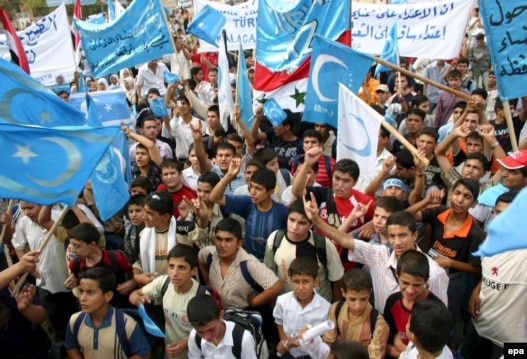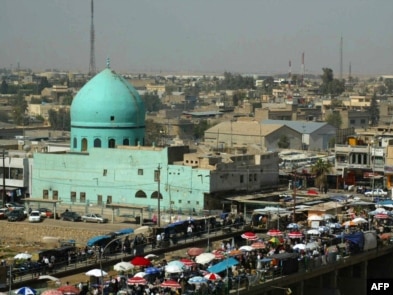 Turkomans demonstrate in Kirkuk in 2006, demanding recognition of their ethnic group’s status in the disputed region.
Turkomans demonstrate in Kirkuk in 2006, demanding recognition of their ethnic group’s status in the disputed region.
But with the vote count from Kirkuk city and its surrounding Tamin Province about 80 percent complete, it is clear that the political landscape is dramatically changing.
The partial vote count shows the secular Al-Iraqiyah coalition and the Kurdistan Alliance in a virtual tie, with the balance between them shifting by only wafer-thin differences as the vote tally rises.
If the current balance holds, it means that the divided province’s Turkoman and Arab populations will have a much louder political voice than before. That in turn could complicate Kurdish hopes of one day incorporating oil-rich Kirkuk into their autonomous region.
Turkoman politicians in Kirkuk make no secret of the fact that they competed in the parliamentary contest precisely with that goal in mind.
United Against Kurdish Ambitions
Hicran Kazanci head of the foreign relations department of the Iraqi Turkoman Front, tells RFE/RL’s Turkmen Service that Turkoman candidates enlisted in a variety of coalitions for the March 7 race. But he says they all agree on one thing.
“Despite the fact the Turkomans went into the election with different coalitions, on major and essential subjects they are united,” Kazanci says. “For example, about the future status of Kirkuk, all of them are united in opposition toward annexing Kirkuk into any federation. And they are united in making Turkoman one of Iraq’s official languages.”

A map Iraq’s ethnic makeup
In the years immediately following the United States’ toppling of Saddam Hussein, both Turkomans and Arabs boycotted attempts to form a provincial government. They expressed anger over what they said were Kurdish efforts to appropriate the province de facto after moving Kurdish peshmerga fighters into the area to support the U.S. invasion.
The Turkomans and Arabs only agreed to take part in the running of the province after a power-sharing deal in 2008. Under that deal, the provincial governor is a Kurd while his two deputies are an Arab and a Turkoman.
But Kirkuk’s provincial parliament is still disputed after Arabs and Turkomans largely stayed away from the first election in 2005, handing the Kurds a majority. The Iraqi government excluded Tamin Province from the January 2009 provincial elections due to fears of sparking sectarian unrest.
Given this background, the fact that this month’s elections for deputies to the national parliament went peacefully in Tamin Province is a major surprise. To ensure security, the Iraqi police fielded 56 mobile patrols in Kirkuk city on election day, while Kurdish peshmerga also spread out less obtrusively across the provincial capital.
Simira Balay, a correspondent for RFE/RL’s Radio Free Iraq, says the Kurdish coalition was caught unawares by the election results, after it “had expected to dominate the election, but it seems the Kurdish vote split among a number of Kurdish parties, including Goran.” She says Kurdish bloc “now is neck and neck with the Iraqiyah list, which got most of the Turkoman and Arab vote.”
The Kurdish coalition comprises the Kurdistan Democratic Party and Patriotic Union of Kurdistan. Goran, a recently created Kurdish opposition party, scored well in recent elections by running on an anticorruption platform.
Resolving Kirkuk Issue
In the aftermath of the elections, Kurdish political leaders — like their Turkoman counterparts — are stressing unity in their position over Kirkuk.
The Kurds see the city as the natural and historic capital of the Kurdish region in northern Iraq. And they insist upon holding a referendum in the province to determine its future status.
“The issue of Kirkuk is [already] in the Iraqi political arena to be solved in accordance with Article 140 of the Iraqi Constitution,” says Rizgar Ali, the Kurdish head of Kirkuk’s provincial council.
Major steps under Article 140 include resolving property disputes created by Hussein’s policy of “Arabizing” Kirkuk, the holding of a census and conducting a referendum to decide the province’s future status.
To date, progress on all these steps has been painfully slow. Most property disputes remain unresolved and unrest in northern Iraq has prevented a census. The referendum, originally planned for no later than the end of 2007, has slipped accordingly.
That limbo is unacceptable to the Kurds, who are sure to use their full representation in the Baghdad parliament, including deputies from the Kurdish region, to continue to press for swift implementation of Article 140.
But it is likely that both the Turkomans and Arabs will use their new voice in the federal legislature to try to subject Article 140 to further negotiation.
According to Rakan Said, the Arab deputy governor of Kirkuk, the election results “laid the ground for dialogue.” He adds that now there are “two parties to the issue of Kirkuk: one is Al-Iraqiyah and the other is the Kurdish coalition. So the platform [for dialogue] has become clear and without interference.”
New Political Landscape
Al-Iraqiyah, headed by former Prime Minister Iyad Allawi, ran on a nonsectarian, nationalist platform. Its success on the national level as a joint front-runner with Prime Minister Nuri al-Maliki’s State of Law coalition has appeared to realign Iraqi politics by relegating sectarian- and ethnic-based parties to the background.
With some 80 percent of the vote counted nationwide, the Shi’ite religious parties’ Iraqi National Alliance are in third place and the Kurdistan Alliance in fourth. Still, Iraqi parliamentary politics is all about making coalitions and in the past the Kurds have proved adept at playing the role of kingmakers.
Whether the Kurdish parties can continue to do so now, or are relegated to a less prominent role, will directly affect Kirkuk’s eventual status. The Kurds want it to be part of Iraqi Kurdistan. And the newly empowered Kirkuk Turkoman-Arab bloc is just as determined to play the spoiler.
Kurds, Arabs, and Turkomans all claim the province around Kirkuk based on a long historical presence in the area.
The Turkic-speaking Turkomans, who claim to be the second-largest group in northern Iraq after the Kurds, trace their presence to the time of the Seljuk Empire, when migrating Turkic tribes conquered a vast expanse of territory stretching from modern Iran to Turkey.
Muhammad Tahir of RFE/RL’s Turkmen Service contributed to this report




